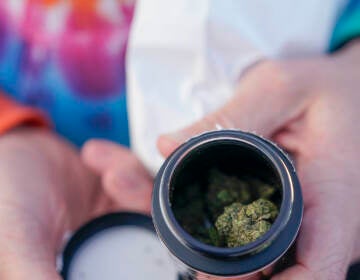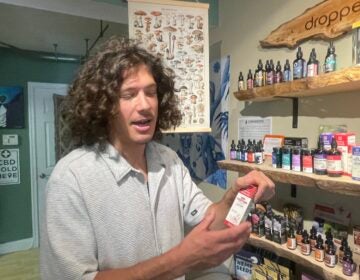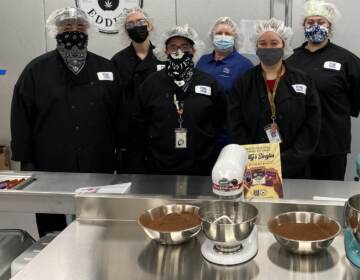High marks for former top cop, prisons boss in new role as Delaware weed czar
Rob Coupe acknowledges his new post is a "drastic change" from his days as a trooper, when he often locked up people for marijuana possession.
Listen 2:24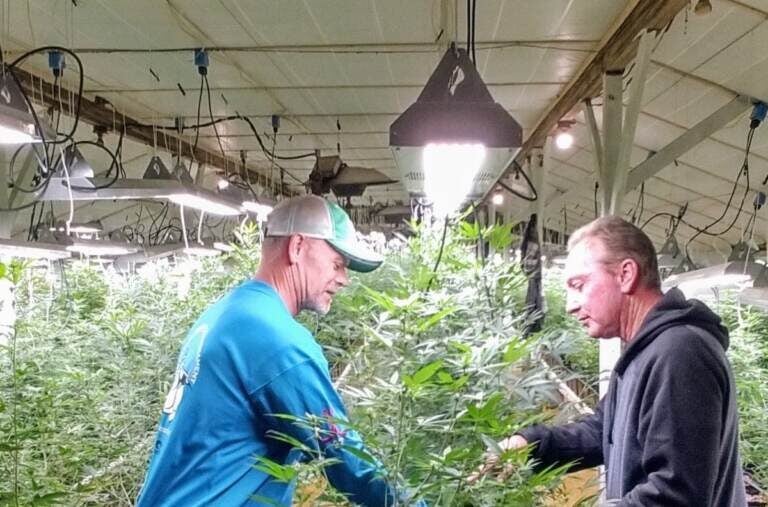
William Rohrer (left) of The Farm, a medical cannabis company, called former top cop Coupe "open-minded, empathetic." (Courtesy William Rohrer)
From Philly and the Pa. suburbs to South Jersey and Delaware, what would you like WHYY News to cover? Let us know!
Back in the mid-1980s, when Rob Coupe was a rookie Delaware state trooper on patrol, he put handcuffs on plenty of drivers who carried marijuana in their car.
As he advanced through the ranks to the top title of superintendent, he oversaw major investigations of weed dealers. After he took command of the prison system, he oversaw the custody of prisoners with cannabis convictions.
Coupe has also held other high-level state posts that targeted criminal activity — homeland security secretary and chief of staff for the attorney general’s office.
Suffice it to say that when it comes to law enforcement in Delaware, Rob Coupe knows where the bodies are buried.
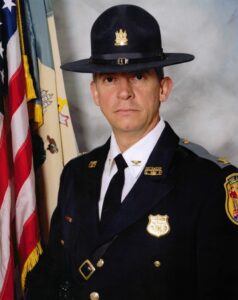
So after state lawmakers legalized weed last April, advocates for users were wary after Gov. John Carney, a staunch foe, nominated fellow Claymont native Coupe for the new post of state marijuana commissioner. Many feared a regimented, militaristic approach was coming.
Zoë Patchell, who heads the Delaware Cannabis Advocacy Network, recalled being suspicious upon learning the former top cop would be in charge of creating the regulatory market and issuing 125 licenses for growers, manufacturers, testers and retailers.
“We definitely had concerns with law enforcement leading the charge on implementation, especially given the history of cannabis prohibition in Delaware,” Patchell said.

Peter Murphy, a Wilmington lawyer who advises clients in the marijuana industry, said he was taken back as well about the possible prospect of an inflexible, top-down approach from the so-called weed czar.
Coupe himself was certainly cognizant of the apprehension about his appointment, he told WHYY News during an interview this month.
“Yes, it’s quite a drastic change,” the commissioner said, “from being a young trooper making those marijuana arrests to now.”
‘He’s been progressive on things but not a pushover’
Nine months into Coupe’s tenure, however, Patchell, Murphy and others are so far giving Coupe high marks.
“The commissioner has certainly been open and willing to discuss the concerns that consumers have had, and is now willing to make adjustments to different regulations to account for the concerns,’’ Patchell said.
Patchell is particularly pleased Coupe is now willing to let recreational dispensaries seek and obtain a variance from his proposal that all marijuana be prepackaged before sale. Patchell and allies had successfully lobbied him to let stores offer “deli-style” packaging in which retailers display leaf marijuana and buds in sealed Mason jars that shoppers can see and smell before deciding whether to buy.
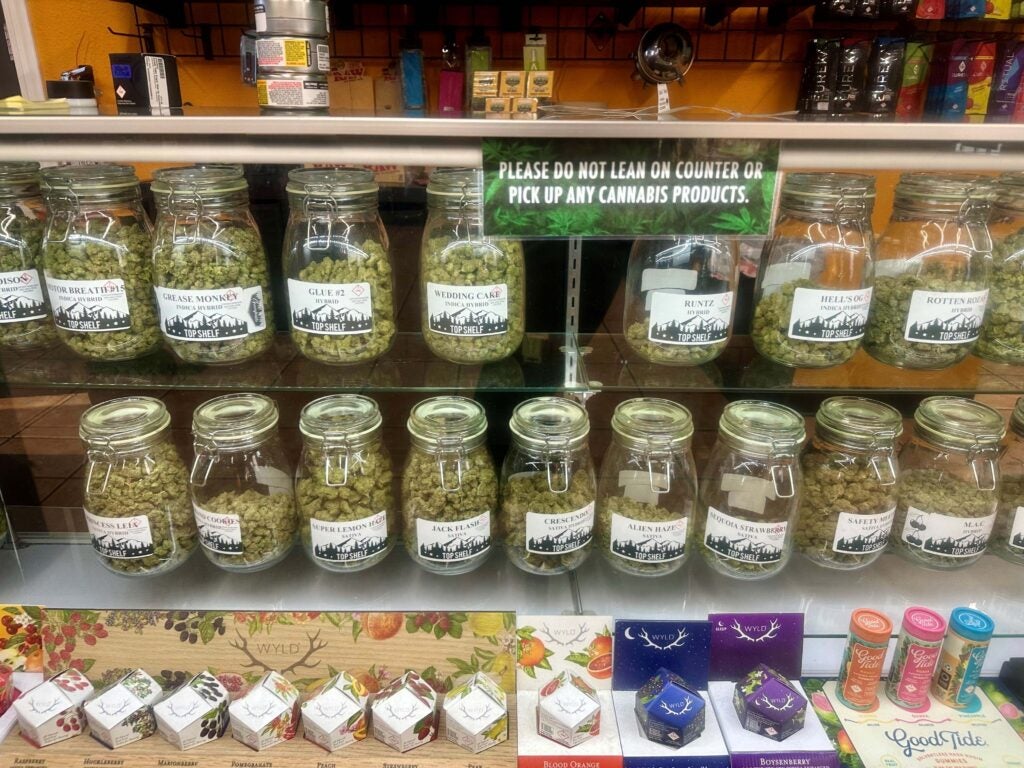
Murphy said ex-cops have long been involved in the legal weed industry and its regulation across the country. In Delaware, for instance, the first medical marijuana license went to a company headed by former state trooper Mark Lally.
“The issues over security were kind of a natural fit for people who knew a lot about security,’’ Murphy said.
Murphy said Coupe has “worked incredibly hard to overcome” trepidation and skepticism that he would rule with a policing mentality.
“Just because somebody’s been a law enforcement officer doesn’t mean they think a certain way,” Murphy said. “He’s really demonstrated that with his leadership so far. He’s been progressive on things but not a pushover by any means. He understands that it’s a really tough job to get right.”
Murphy noted that dispensary operators and advocates for users don’t always agree, and Coupe is “doing a really good job navigating that.”
For example, Coupe did not consent to one significant proposal by the state’s six medical marijuana companies, which operate 12 dispensaries. They wanted Coupe to let them begin selling recreational marijuana while regulations were developed, applications for licenses were submitted and granted, and the crops of cannabis were being grown to fill dispensaries with buds, edibles and other products for recreational users.
Patchell and other advocates had opposed that move, arguing it would give the medical dispensaries an unfair competitive advantage over other retailers entering the new market.
As a compromise of sorts, Coupe has agreed to work with Rep. Ed Osienski, sponsor of the legalization and regulatory bills, on legislation that would let the medical dispensaries sell recreational marijuana in their existing facilities when the new retailers are ready to open — likely a year from now. Recreational buyers will pay a 15% tax on all sales.
“Delawareans should be able to walk into any dispensary and get either recreational or medical, instead of having separate facilities,’’ said Osienski, a Newark-area Democrat who plans to introduce such a bill in the coming weeks.

Osienski said Coupe’s deft handling of the issue, and willingness to work with all parties, illustrates his flexibility.
Osienski said he’s not surprised by Coupe’s smooth transition, noting that the commissioner has hired competent aides and consultants.
“Commissioner Coupe is a professional and in those other positions, that was his job,’’ Osienski said of Coupe’s previous law enforcement posts. “Now his job is to oversee and regulate the recreational marijuana industry and I think he’s doing a great job.”
William Rohrer, who runs The Farm, which has two Delaware medical growing operations and dispensaries, was disappointed his stores could not begin selling recreational weed before new licenses get awarded, but still applauds how Coupe has run the office.
“He’s got a very tough job and it was hard to really predict where we were going to go with somebody like Commissioner Coupe and his background, but he’s a very open-minded, empathetic person,” Rohrer said. “He understands that in order for this to work, you need a business arm, a regulatory arm and a taxation arm. He’s done an excellent job of addressing the issues and establishing a strategy that is good for Delaware.”
‘A guy that will listen, and really, really listen’
After he took office in 2017, Carney made no secret of his strident opposition to legalization. And in 2022, after the General Assembly approved a bill to remove criminal penalties, Carney vetoed it, and lawmakers couldn’t muster the support for an override.
But in 2023, lawmakers approved legal weed again, and when Carney realized an override was likely, he let it become law in April without his signature. Then the governor turned to Coupe, who was then chief of staff for the state’s Department of Information and Technology.
Carney told WHYY News this month that he named Coupe in large part because many people he spoke with were concerned with the public safety aspect of legalization.
“His reputation speaks for itself,” Carney said. “This guy’s got a resume that’s unparalleled with respect to that — corrections, superintendent of state police, everything that he’s done in terms of that law enforcement career.”
“I also knew that he was a guy that will listen, and really, really listen. Not just listen to go through the motions, but to listen and learn. This was all new to him. And he went right to work finding out what was happening in other states. So I have every confidence that Coupe’s going to do a good job. He’s already demonstrating that.”
Coupe said he relished the new challenge in creating Delaware’s market, noting that Carney told him not to “overregulate it but to ensure that we do have balanced regulations and oversight to ensure that this industry is lawful, and again, that we make it as safe as we can.”
He’s met with people concerned about health effects on teens and young adults, but stressed that weed is only legal for adults 21 and older. He’s also spoken at length with advocates for users, and those in the industry, saying people from both constituencies “have been great sharing their insight and experience.”
He’s made presentations to the state’s Marijuana Act Oversight Committee, a 15-member advisory body, and to the legislative Joint Finance Committee that makes changes to the governor’s recommended budget.
Coupe said that while some 18,000 Delawareans use marijuana for medical purposes, tens of thousands more use it recreationally, as do those who drink alcohol and buy it at regulated liquor stores, restaurants and bars. Under Delaware’s law, weed must be consumed at a private home.
The bottom line, Coupe said, is that he views his job as “balancing a lot of those interests” while prioritizing the protection of the public.
Coupe also understands that his background initially troubled many cannabis advocates.
“Life has evolved a lot since February 26, 1985, on so many levels,’’ Coupe said, referring to the day he entered the state police training academy. “I made marijuana arrests during my career and now I’m the commissioner overseeing the retail market. It’s legal now. Possession’s legal. Consumption’s legal.”
State Sen. Dave Lawson, a Kent County Republican and retired state trooper who voted ‘no’ on legalization, said those in the weed industry and its regulation are finally learning what his policing colleagues have long known.
“He’s excelled in everything he’s touched,” Lawson said. “And he continues to stand out. He’s not a pushover, I agree, but he’s also very, very reasonable.”

Lawson said he jokingly told Coupe recently that he’s held so many high-level posts in state government that “Your problem is you can’t hold a job.”
“He’s bounced from one job to the other to the other, but he’s done a good job every time. I’m a fan of Rob Coupe,” Lawson said.

Get daily updates from WHYY News!
WHYY is your source for fact-based, in-depth journalism and information. As a nonprofit organization, we rely on financial support from readers like you. Please give today.




